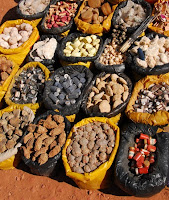The use of 'traditional', 'alternative' or 'complementary' medicine is now a multi-billion dollar industry around the world. This type of medicine, when adopted by non-indigenous populations, is often labeled as the ‘medicine of the poor' and still an estimated 80% of the populations in some African and Asian countries depend on this traditional medicine for basic health care.
In Angola, the use of traditional medicine goes back around 4000 years, according to Rosário Fernandes, a traditional medicine researcher. She discovered that most of the practices originated in the primitive culture of the tribal communities called Sam (Hottentots) and the Bantu.
Some examples of traditional medicine: the tea from the Mbrututu root does not need boiling water, and is ideal as a cure for hepatitis; a mix of honey and lemon is recommended for the flu and sore throats; other local-gathered herbal products have 'power' to cure, like tea from Caxinde, Chandala, Gipepe, and Ngandiadia; all initially labeled in the local people's languages.
For recent mothers, the Angolan pharmacist recommends “closing the wounds from the birth” with a bath made from a lukewarm infusion of the plant called capim de Deus ('God's grass'). For the new-born, drinking Mukumbi is good for colic. It is also a remedy for anemia and blood loss. Additionally, the bark of the ‘Timba-Timba’ tree is apparently the African version of Viagara.
Traditional medicine is defined as, 'the sum total of knowledge, skills and practices based on the theories, beliefs and experiences indigenous to different cultures that are used to maintain health, as well as to prevent, diagnose, improve or treat physical and mental illnesses.”
The basic theory underlying traditional medicine in Angola “arose from the empirical observation of how man reacted with the environment. Primitive man watched natural phenomena and managed to create a conceptual structure that could be transposed to the human body."
According to the researcher, before the arrival of the Europeans who disembarked on Angolan shores, the local peoples (Hottentots, Bantu, and others), solved their own health problems, including the plague, epidemics, spiritual and emotional illnesses, by recourse to traditional medicine. “The Imbanda (practitioners), could diagnose, prevent, treat and cure illnesses that occurred in their times, whether hereditary or otherwise. (adapted from TAAG Austral Magazine)



No comments:
Post a Comment